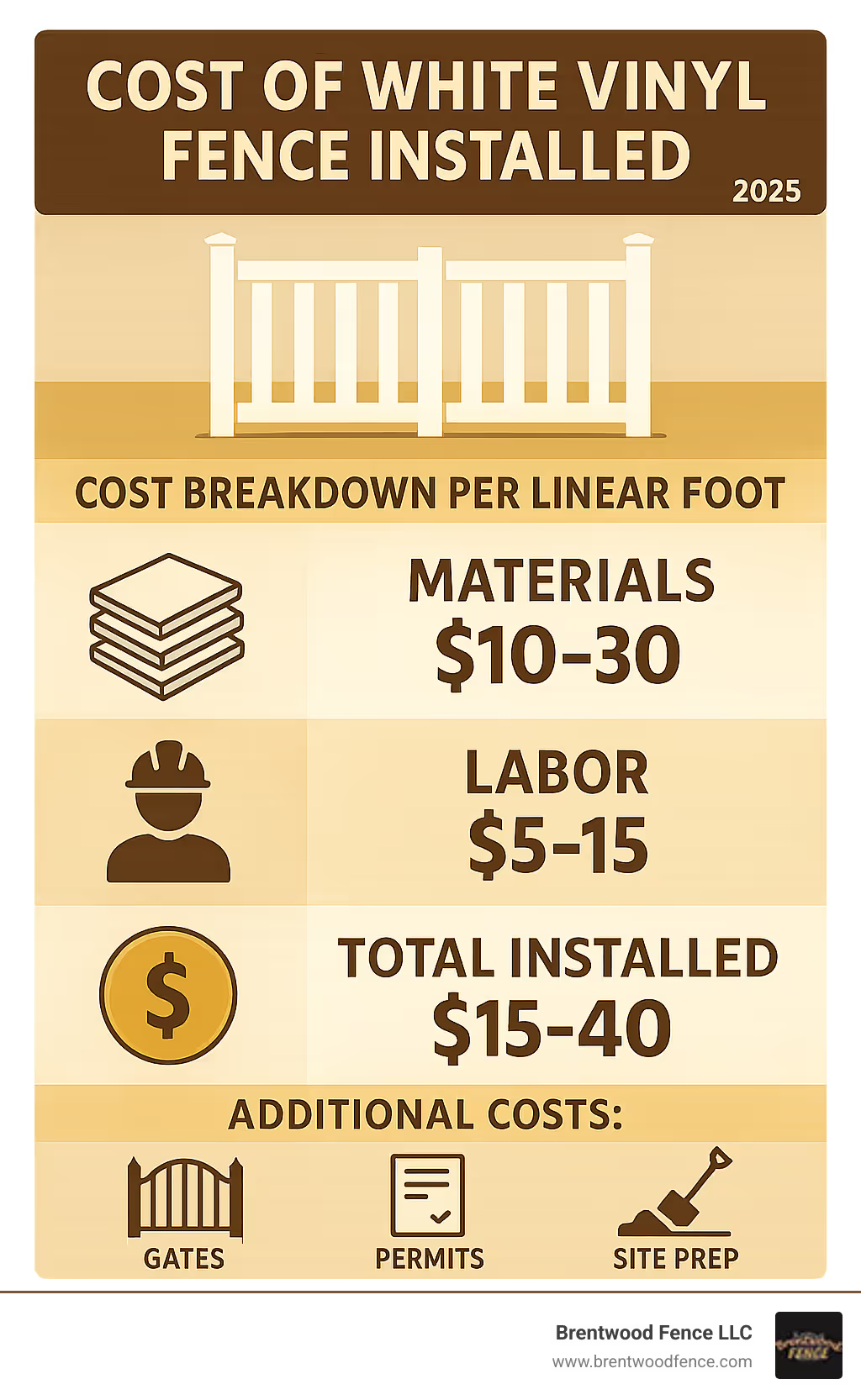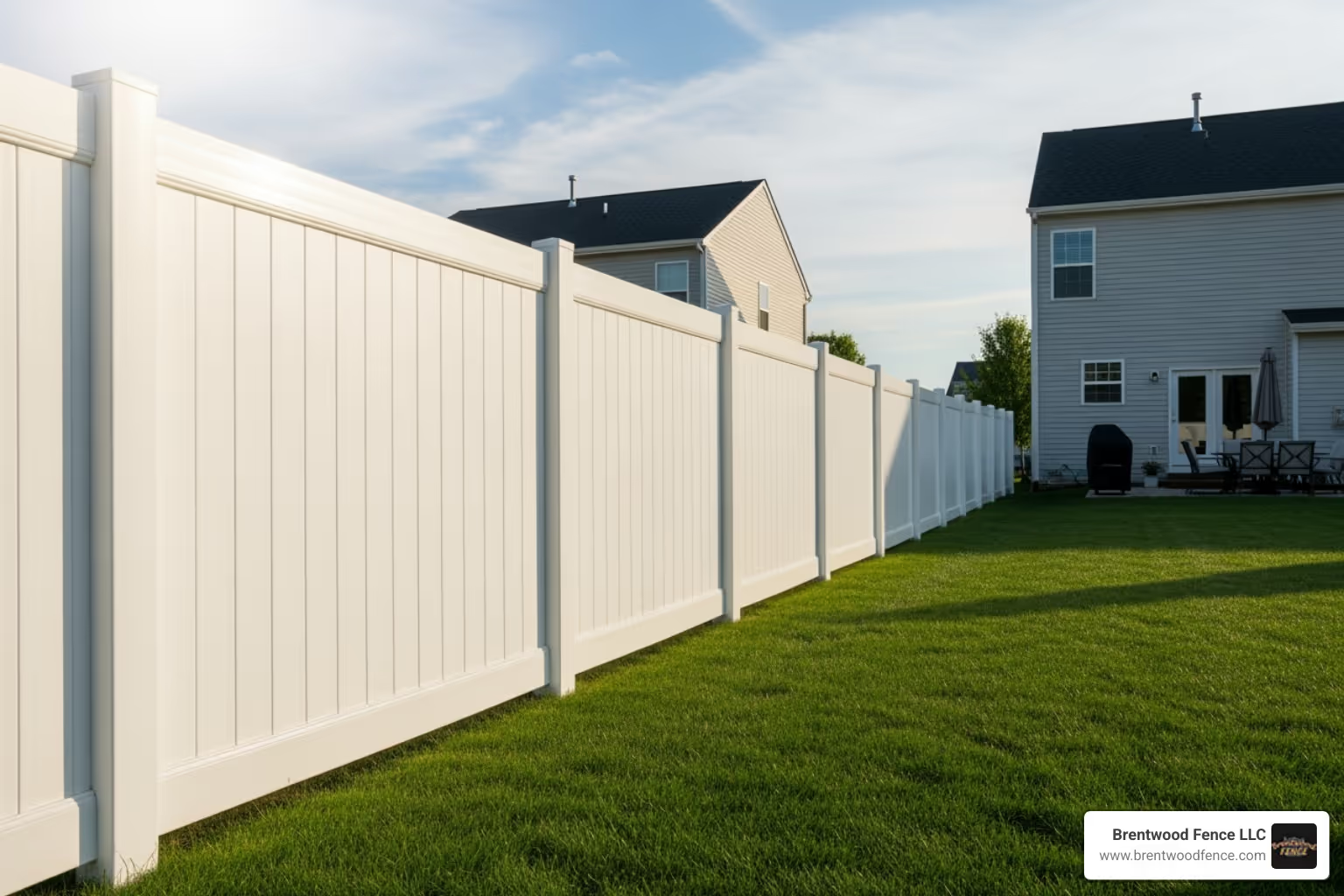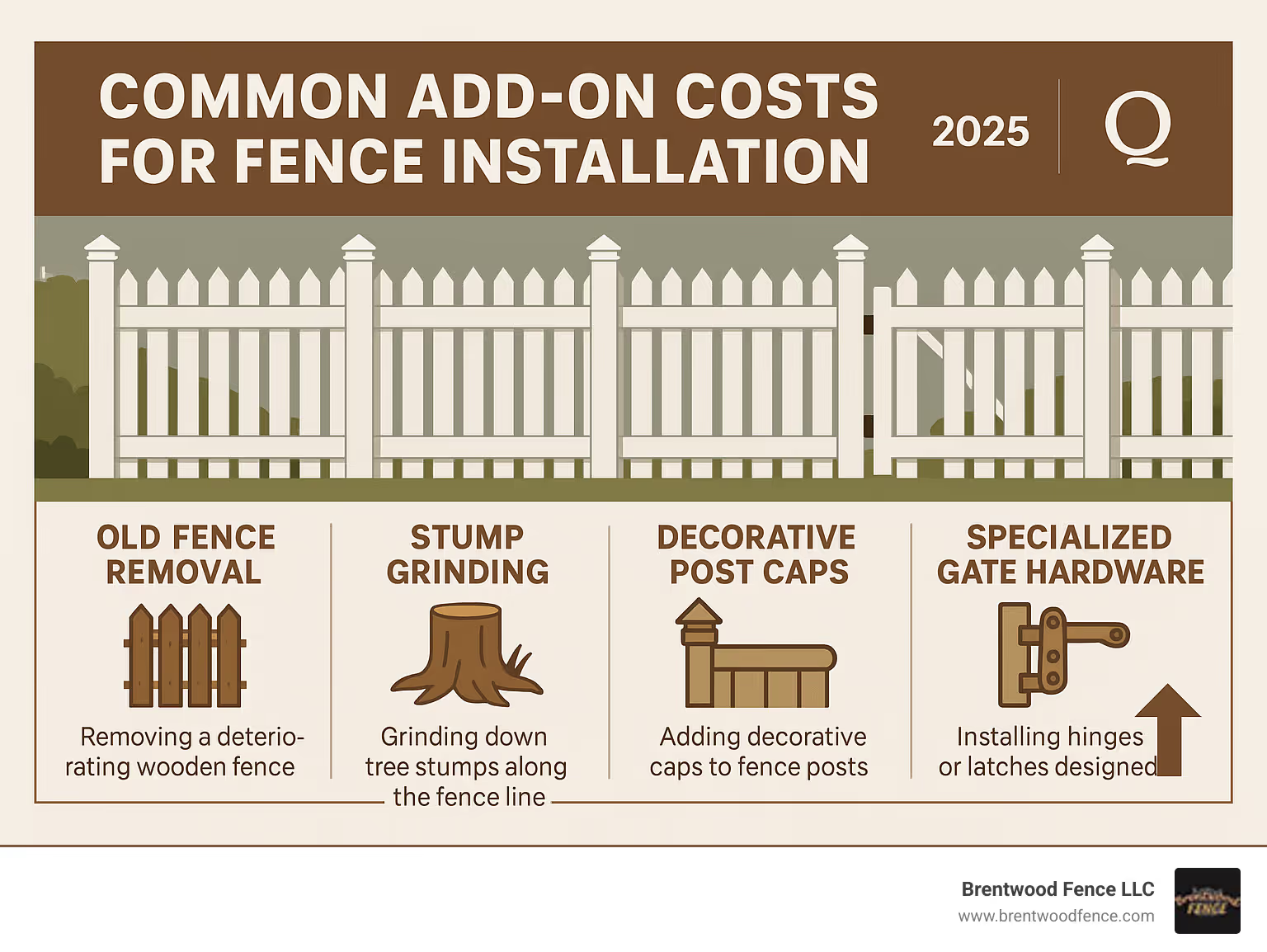Blog Content
28
Sep
2025

The cost of white vinyl fence installed ranges from $15-40 per linear foot, with most homeowners paying an average of $4,142 for a complete project. Here's a quick look at the numbers:
Quick Cost Breakdown:
White vinyl fencing offers a clean, classic look without the constant maintenance of wood. It delivers decades of curb appeal with just an occasional rinse, saving you from painting and rot repairs.
While the upfront cost is higher than basic wood or chain-link, vinyl's zero maintenance costs and potential 60% return on investment prove its long-term value. A quality installation lasts 20-30 years, making it a smart, one-time investment. Your final price depends on fence height, length, gates, and local labor rates. Difficult terrain or removing an old fence can add $3-18 per linear foot.

Quick look at cost of white vinyl fence installed:
For a 2025 white vinyl fence project, the national average is $4,142. Most homeowners spend between $2,328 and $5,956, depending on the project size and style. For example, a typical 100-foot perimeter fence costs around $4,000, while a 200-foot fence would be closer to $8,000. These figures include materials, posts, and professional installation.
Materials typically account for $10 to $30 per linear foot for quality vinyl that won't crack or fade. Labor adds another $5 to $15 per linear foot, covering the skilled work of digging post holes, setting them in concrete, and ensuring perfect alignment. Labor costs in New Hampshire and Massachusetts may be on the higher end of this range.
Breaking down the cost of white vinyl fence installed per linear foot shows the value you receive. The material cost of $10-$30 per foot buys high-quality vinyl that lasts 20-30 years without painting. Thicker, reinforced, or decorative panels are at the higher end of this range. The labor cost of $5-$15 per foot covers the precise, skilled work required for a professional installation that will stand straight and strong for decades, even on sloped ground.
Fence height significantly impacts your final price. Taller fences require more material, deeper post holes, more concrete, and stronger engineering to handle wind.
Beyond the basic length and height, several factors can alter the final cost of white vinyl fence installed. Understanding these variables helps you budget accurately and avoid surprises.
Key factors that influence your fence's price include:

Proper post spacing is crucial for the strength and longevity of your fence. While panels come in standard 6 or 8-foot widths, a professional installer ensures the post count and placement are perfect for your specific layout. To learn more about our process, check out our Vinyl Fencing Installation Services.
The style of your fence makes a big difference in cost. Privacy fences ($25-$60/ft) use solid, interlocking panels and are the most expensive option. Classic picket fences ($15-$20/ft) use less material and are more budget-friendly. For a rustic look, three-rail or ranch-rail fences ($15-$25/ft) are an affordable way to mark property lines. You can also add decorative touches like lattice tops, which add elegance and cost.
Gates are a separate cost that depends on size and type. A standard 3- to 4-foot walk-through gate typically adds $300 to $800 to your project, including hardware. A double-drive gate (8 to 12 feet wide) for vehicles is larger and requires stronger support, costing anywhere from $800 to $1,500. Upgrades like self-closing hinges or magnetic latches will also increase the price.
Professional labor typically runs from $5 to $15 per linear foot. These rates reflect the skill required for a durable, professional finish, a fact supported by data from sources like the U.S. Bureau of Labor Statistics. Don't forget permit fees, which usually cost between $20 and $60. A professional installer can handle the permitting process to ensure your fence complies with all local codes in places like Exeter, NH, or Haverhill, MA.
Your yard's landscape can impact the final cost. Sloped ground may require special installation techniques like "stepping" or "racking" the panels, which takes more time. Rocky soil is harder to dig and may require specialized equipment, increasing labor costs. In colder climates like New Hampshire and Maine, posts must be set below the frost line to prevent heaving, which means deeper holes and more concrete.
The initial quote for materials and labor doesn't always tell the whole story. Several add-on expenses can affect the final cost of white vinyl fence installed, so it's wise to plan for them to avoid sticker shock.

If you're replacing an existing fence, you'll need to account for removal and disposal. Demolition work typically costs $3 to $5 per linear foot. Hauling away the old material and paying landfill fees can add another $100 to $500 to your project total.
Customizing your fence with design upgrades will increase the price. Popular options include lattice tops for a decorative touch, and stylish post caps like Gothic, New England, or even solar-powered LED caps. You can also opt for thicker panels or reinforced rails for improved durability. While white is the most affordable color, choosing tan, gray, or dark colors can significantly increase material costs, sometimes doubling them.
Your yard may need some work before the fence can be installed. Brush and tree removal is a common extra expense, with tree removal averaging around $700 per tree and stump grinding about $345 per stump. If the installation area is difficult for the crew to access with equipment, labor costs may rise due to the extra manual work. Finally, a professional installer will ensure underground utilities are marked (by calling 811) to prevent dangerous and costly accidents.
When choosing a fence, it's important to look beyond the initial sticker price. While the upfront cost of white vinyl fence installed might seem high, its long-term value becomes clear when compared to other common materials.

This is where vinyl truly shines. It resists rot, rust, and insects, requiring no painting or staining—just an occasional wash. Its 20 to 30-year lifespan means you save significant time and money on upkeep.
Here’s a quick look at the average installed costs per linear foot for different fencing materials:
While wood may seem cheaper initially, its ongoing maintenance costs can make vinyl the more economical choice over time. Vinyl's durability and lasting curb appeal also offer a strong return on investment if you decide to sell your home.
When considering the cost of white vinyl fence installed, it’s natural to wonder if a DIY approach could save money. While cutting out labor costs is appealing, vinyl fence installation is more complex than it appears. Renting specialized tools like post-hole diggers and concrete mixers can be costly, and a project that takes a professional crew a few days could take you months of weekends.
Furthermore, many vinyl fence manufacturers require professional installation to honor their warranties. For a clear understanding of what your project entails, consider getting a Free Fencing Installation Estimate.
DIY might work for a short, decorative fence on perfectly flat ground. However, it's rarely a good idea for larger projects, sloped terrain, or if you're unfamiliar with local building codes. Mistakes with post depth—especially setting them below the frost line in New Hampshire—or panel alignment can lead to a weak, crooked fence and may even require you to start over.
Professional installers offer experience, efficiency, and quality guarantees. They have the right equipment to handle challenges like rocky soil and ensure every post is perfectly plumb and secure. This expertise ensures a faster timeline with less disruption to your property. Most importantly, professional installation typically comes with a manufacturer warranty, protecting your investment. The peace of mind knowing your fence is built to last through harsh New England weather is often worth the cost.
Homeowners often have similar questions when budgeting for a new fence. Here are concise answers to the most common concerns about the cost of white vinyl fence installed.
The number of posts depends on your fence's total length and the panel width you choose (usually 6 or 8 feet). For a 100-foot run, you'd need about 18 posts for 6-foot panels or 14 posts for 8-foot panels. You will also need extra posts for corners and gates. A professional site visit is the best way to get an exact count for your specific layout.
Yes, absolutely. White is the most affordable and common option. Moving to colors like tan or gray comes at a premium, and choosing darker colors like black or brown can nearly double the material cost. This is because darker vinyl requires specialized pigments and manufacturing processes to prevent fading and warping from heat absorption.
A professionally installed white vinyl fence is expected to last 20 to 30 years. The best part is that its annual maintenance expense is effectively zero. Unlike wood, vinyl doesn't need painting or staining—just an occasional wash with soap and water to keep it looking new. While a major impact (like a falling tree) could lead to repair costs, these events are rare. The upfront investment saves you decades of maintenance costs and labor.
Planning your cost of white vinyl fence installed is manageable when you know the key factors. The average project costs around $4,142, with a typical range of $15-$40 per linear foot. While the upfront cost is higher than wood, vinyl's 20-to-30-year lifespan with zero annual maintenance makes it a superior long-term investment. No painting, no rot—just lasting curb appeal.
For the best value, plan for your total fence length, desired height, and any gates. Be realistic about site challenges like slopes or old fence removal, as these affect the final price. While DIY is an option for small jobs, professional installation ensures quality, code compliance, and durability, protecting your investment for years to come.
When your fence is built right the first time, it adds real value to your property. For more insights into choosing the right team, check out More info about vinyl fence installers.
Ready to turn your fence dreams into reality? Brentwood Fence LLC is here to guide you through every step of the process. Let's get started on creating the perfect fence that fits your vision and your budget!
Copyright 2022 Brentwood Fence | All Rights Reserved | Sitemap | Website by Plumb Development a Digital Marketing Agency